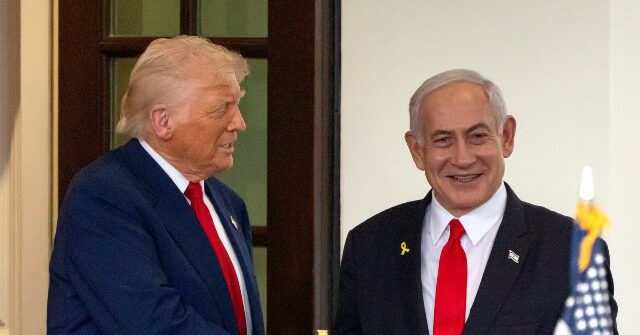Israeli Prime Minister Benjamin Netanyahu has accepted a controversial proposal for a hostage and ceasefire deal by U.S. Special Envoy Steve Witkoff — but Hamas has criticized it and may not accept it, at least for now.
The original proposal was widely criticized by Israel, including by members of the Israeli cabinet, because it only guarantees the release of about half the hostages, and gives the United Nations responsibility again for delivering aid. (The United Nations is seen as colluding with, or at least dominated by, Hamas, which steals aid and uses it to control the population of Gaza; the U.S. this week launched an alternative aid mechanism.)
As Breitbart News reported:
Witkoff’s ceasefire proposal calls for the release of 10 living hostages — roughly half of those remaining — as well as the bodies of 18 dead Israeli hostages, in exchange for a 60-day ceasefire, 125 convicted Palestinian terrorists serving life sentences, 1,111 Gaza residents detained during the present conflict, and the resumption of humanitarian aid through the United Nations, i.e. not the new Gaza Humanitarian Foundation (GHF).
The Israeli opposition has said the government should accept the deal, which Hamas has not yet accepted. However, others — including ministers in Israeli Prime Minister Benjamin Netanyahu’s cabinet — have called it a “lifeline for Hamas,” which had reportedly begun to lose its control of the Gazan population since the U.S.-backed GHF began operations this week. They are concerned that the deal would let Hamas regroup.
Netanyahu has, however, reportedly approved the plan, according to the Times of Israel, which also reported that Hamas is still reviewing it — but says that it does not meet the organization’s demands.
(The White House also said that it obtained Israel’s agreement before floating the Witkoff proposal.)
The main sticking point for Hamas is likely to be that the proposal does not end the war, but rather allows Israel to continue fighting after the 60-day ceasefire period.
If Hamas rejects the plan, then Israel and the U.S. will continue working on their alternative aid mechanism, which is seen by observers as chipping away at Hamas’s political control of the Gaza Strip, while the Israeli military destroys what is left of Hamas’s army.
That would also mean the hostages would remain in captivity. Israel may try to isolate individual Hamas cells and negotiate with them directly, or else suffer the heavy price of losing the hostages to win the overall war.
Joel B. Pollak is Senior Editor-at-Large at Breitbart News and the host of Breitbart News Sunday on Sirius XM Patriot on Sunday evenings from 7 p.m. to 10 p.m. ET (4 p.m. to 7 p.m. PT). He is the author of Trump 2.0: The Most Dramatic ‘First 100 Days’ in Presidential History, available for Amazon Kindle. He is also the author of The Trumpian Virtues: The Lessons and Legacy of Donald Trump’s Presidency, now available on Audible. He is a winner of the 2018 Robert Novak Journalism Alumni Fellowship. Follow him on Twitter at @joelpollak.
Read the full article here


